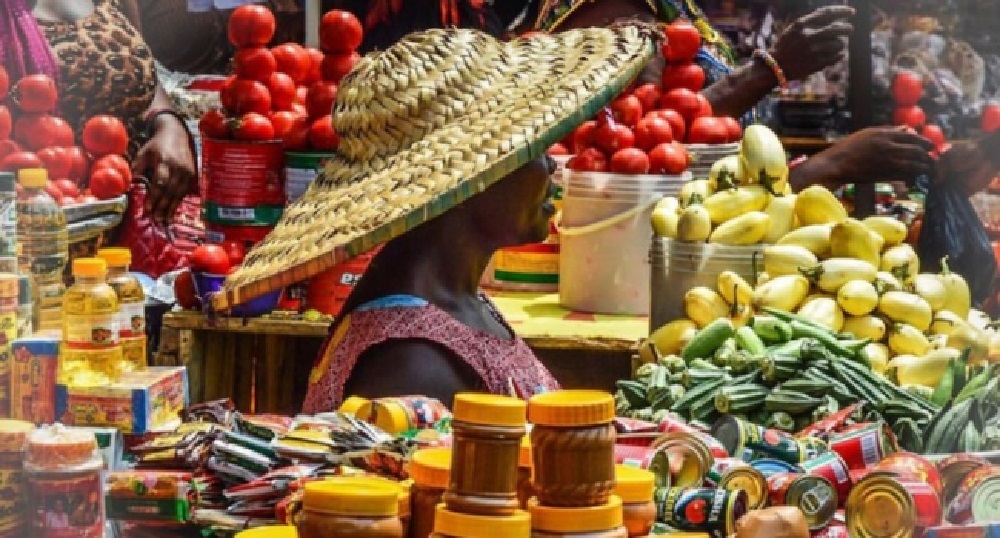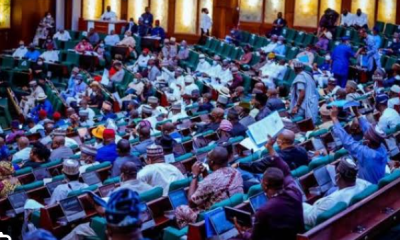Economy
Inflation surged to 24.23% due to escalating cost of living

Inflationary pressure has reappeared as Nigerians grapple with increases in average costs of basic food items and energy.
For the first time after the rebasing of the Consumer Price Index (CPI), headline inflation spiked in March to 24.23 per cent – 105 basis points above the 23.18 per cent recorded in the previous month.
The National Bureau of Statistics (NBS) yesterday indicated that the rate of increase in the average price level was higher in March than the level in February.
In January, the NBS updated the weight and price reference periods in calculation of the CPI to make the inflationary gauge more reflective of changes in consumption patterns and the economy generally.
The rebasing did not only brought the base year closer to the current period from 2009 to 2024, it also introduced some critical methodology changes to improve the computation processes.
After the rebasing, inflation dropped from 34.80 per cent in the pre-rebased period of December 2024 to 24.48 per cent in January 2025. It dropped further to 23.18 per cent in February.
In its latest report, NBS recorded 186 basis points changes between the monthly inflation rate, with the month-on-month rate rising from 2.04 per cent in February to 3.90 per cent in March.
The NBS attributed the spike to the rise in costs of food and alcoholic beverages, fuels and electricity, among other items.
Analysts at CardinalStone said the resurgence was due to renewed foreign exchange (forex) pressures amid heightened global risk-off sentiment.
They pointed at foreign portfolio investments (FPIs) outflows and increased dollar demand, which saw naira dropping by 2.4 per cent in March.
Experts also cited increase in price of Premium Motor Spirit (PMS) or petrol, following the temporary suspension of the naira-for-crude swap arrangement.
Food inflation rate stood at 21.79 per cent in March 2025. The composite food index decreased to 21.79 per cent from 23.51 per cent.
Core inflation, which excludes volatile agricultural produce prices and energy, rose to 24.43 per cent from 23.01 per cent.
Specifically, the month-on-month food inflation rose by 50 basis points from 1.67 per cent in February to 2.18 per cent in March.
The NBS attributed the increase in food inflation to increases in the average prices of basic food items including ginger, garri, broken rice, honey, crabs, potatoes, plantain flour, periwinkle and pepper amongst others.
On a state-by-state basis, food inflation was higher in Oyo with 34.41 per cent; Kaduna (31.14 per cent) and Kebbi (30.85 per cent).
On the other side, the 9.61 per cent recorded by Bayelsa; Adamawa (12.41 per cent) and Akwa Ibom (12.60 per cent), were the lowest inflation rates.
Analysts expressed concerns that the resurgent inflationary pressure might lead to renewed tightening stance by the Central Bank of Nigeria (CBN).
CBN Governor Dr. Olayemi Cardoso, had at the end of the first Monetary Policy Committee (MPC) meeting in 2025, reiterated the apex bank’s commitment to orthodox monetary policies, noting that the apex bank’s stance will be reflective of the inflationary trend.
With inflation rate dropping in February, the MPC had decided to maintain all key monetary policy parameters, including the Monetary Policy Rate (MPR) at 27.50 per cent, the asymmetric corridor around the MPR at +500/-100 basis points, the Cash Reserve Ratio (CRR) at 50.00 per cent for Deposit Money Banks and 16.00 per cent for Merchant Banks, and the Liquidity Ratio at 30.00 per cent.
Clarifying the impact of the rebased CPI, Cardoso had explained that the lower inflation figure should not be misinterpreted.
He underlined the need to analyse more data before drawing comparisons, noting that the CBN is currently assessing the figures and will provide further guidance in due course.
The CBN boss stressed the critical importance of collaboration between monetary and fiscal authorities in sustaining recent economic improvements.
Addressing concerns about the impact of elevated borrowing costs on economic growth, the CBN governor assured that the apex bank’s primary objective is to stabilize the foreign exchange and financial markets.
He expressed confidence that such stability would attract increased foreign investments, stimulating the much-needed economic growth.
Cardoso also highlighted the competitiveness of the Nigerian currency, which has spurred growing interest from international investors.
Economy
CBN launches new platform, targets $1bn monthly diaspora remittances

The Central Bank of Nigeria, in collaboration with the Nigeria Inter-Bank Settlement System, has launched the Non-Resident Bank Verification Number platform, an initiative aimed at enhancing financial access for Nigerians in the diaspora.
The platform, which enables Nigerians abroad to obtain their Bank Verification Number remotely, removes the need for physical presence in Nigeria.
Speaking at the event in Abuja on Tuesday, CBN Governor, Mr. Olayemi Cardoso, described the platform as a key milestone in the country’s financial inclusion journey.
He noted that the NRBVN would ease the long-standing challenges faced by Nigerians in the diaspora who previously had to be physically present in Nigeria for BVN registration.
“For too long, many Nigerians abroad have faced difficulties accessing financial services at home due to physical verification requirements,” Cardoso said. “The NRBVN changes that. Through secure digital verification and robust Know Your Customer processes, Nigerians worldwide will now be able to access financial services more easily and affordably.”
The governor added that the NRBVN was not just a solution for financial access, but a step towards a more inclusive, innovative, and prosperous financial ecosystem.
“We are building a secure, efficient, and inclusive financial ecosystem for Nigerians globally,” he remarked. “This platform is not just about financial access, it’s about national inclusion, innovation, and shared prosperity.”
Cardoso also highlighted the growth in remittance flows, which increased from $3.3bn in 2023 to $4.73bn in 2024. He attributed this rise to recent reforms, including the introduction of the willing buyer, willing seller FX regime.
With the launch of the NRBVN, the CBN is targeting $1bn in monthly remittances.
“With the introduction of NRBVN and complementary policy measures, we are optimistic about achieving our ambitious target of $1bn in monthly remittance flows, a goal we believe is entirely achievable given the growing trust and convenience in formal remittance channels,” Cardoso said.
The event also featured a presentation by the Managing Director/CEO of NIBSS, Mr Premier Oiwoh, who detailed the technical and operational aspects of the NRBVN platform.
Oiwoh emphasised that the platform adheres to global standards, incorporating stringent Anti-Money Laundering and KYC compliance protocols to ensure transparency and security.
The Deputy Governor, Economic Policy, CBN, Mr Muhammad Abdullahi, also addressed the gathering, describing the NRBVN as a transformative tool for enhancing the banking experience for Nigeria’s diaspora.
He urged stakeholders to collaborate in refining the platform to meet the evolving needs of the diaspora community.
He further emphasised that the initiative would strengthen economic ties between Nigeria and its global citizens, and ultimately drive sustainable economic growth.
“Together, we stand at the threshold of a new era, poised to deepen the trust, enhance remittance growth, and forge a stronger, more meaningful connection between Nigeria and its global citizens,” Abdullahi said.
The NRBVN platform is part of a broader framework that includes the Non-Resident Ordinary Account and Non-Resident Nigerian Investment Account, which provide Nigerians in the diaspora with access to savings, mortgages, insurance, pensions, and investment opportunities in Nigeria’s capital markets.
Under current regulations, diasporans will have the flexibility to repatriate the proceeds of their investments.
The launch of the NRBVN platform marks a crucial step in the CBN’s efforts to improve financial inclusion and harness the economic potential of Nigeria’s diaspora.
Economy
SEE Black Market Dollar (USD) To Naira (NGN) Exchange Rate Today 12th May 2025

Below is the black market exchange rate for the US Dollar to Naira as of Sunday, May 11, 2025. These are the rates at which you can exchange your dollars for naira.
Black Market Dollar to Naira Exchange Rate (Aboki FX)
According to sources at the Bureau De Change (BDC) in Lagos, the dollar was bought at ₦1625 and sold at ₦1630 on Sunday, May 11, 2025.
Important Notice:
The Central Bank of Nigeria (CBN) does not officially recognize the parallel market, also known as the black market. The CBN advises anyone seeking foreign exchange to do so through their commercial banks.
Dollar to Naira Exchange Rates Today
Market Type Buying Rate Selling Rate
Black Market (Aboki) ₦1625 ₦1630
CBN Official Rate ₦1608–₦1614 –
Please note: Exchange rates may differ depending on the vendor or location, and the rates presented here might vary slightly from the actual rate at the point of transaction.
Economy
Naira Gains Slightly Against Dollar On May 8, 2025

On Thursday, May 8, 2025, the naira is exchanging for ₦1,627 to 1 US dollar at the parallel market (black market) in Nigeria.
This reflects the current rate at which individuals are trading dollars for naira outside of official financial institutions.
This means that for every one dollar, you can get the equivalent in naira of ₦1,627 on May 8, 2025, showing a very slight improvement compared to the previous day, indicating a momentary easing of pressure on the naira against the dollar.
Thursday, May 8, 2025, records a marginal upward movement in the exchange rate, suggesting a bit of stability in the local currency for those transacting in foreign exchange.
The black market rate represents the value at which individuals can trade their dollars for naira outside official exchange channels, where the currency’s value is largely driven by supply and demand dynamics rather than government regulation.
Note that the Black Market Exchange rate is typically higher than the official exchange rate because it is not regulated by the government and reflects a more immediate, fluctuating market response.
Today’s exchange rate has slightly improved compared to yesterday, Wednesday, May 7, when the naira exchanged at ₦1,628 per dollar. (This means the naira gained a bit of value in the past 24 hours, possibly due to a brief easing in dollar demand or better forex inflow.)
The value of a country’s currency is determined by aggregate supply and demand, influenced by factors such as national interest rates, inflation, capital flow, and the overall money supply.
These forces, both internal and external, affect the strength of a nation’s currency and contribute to exchange rate fluctuations. The most common method to assess a currency’s value is through exchange rates. The two main exchange rate systems are the fixed rate and the floating rate systems, with the parallel market rate offering a real-time reflection of currency trends.
Investors and market participants closely monitor parallel market rates for a more immediate and practical reflection of currency trends, often making it a reliable indicator of short-term shifts in economic conditions.
-

 News19 hours ago
News19 hours agoJust in: Another major headache as 3 PDP senators defect to APC
-

 News19 hours ago
News19 hours agoCourt Jails Two Six Months for Naira Abuse in Lagos
-

 News20 hours ago
News20 hours agoUnion seals Lagos company over racial discrimination of workers
-

 News19 hours ago
News19 hours ago$1.43m scam: Ajudua on the run as Supreme Court orders his return to prison
-

 News21 hours ago
News21 hours agoCBN warns public against fraudsters claiming to act on its behalf
-

 News17 hours ago
News17 hours ago10 WAEC students still missing as Rivers women demand Sole Administrator’s intervention
-

 News17 hours ago
News17 hours agoReps reject bill on rotational presidency among six geopolitical zones
-

 News3 hours ago
News3 hours agoKano varsity shuts female hostel over immorality






